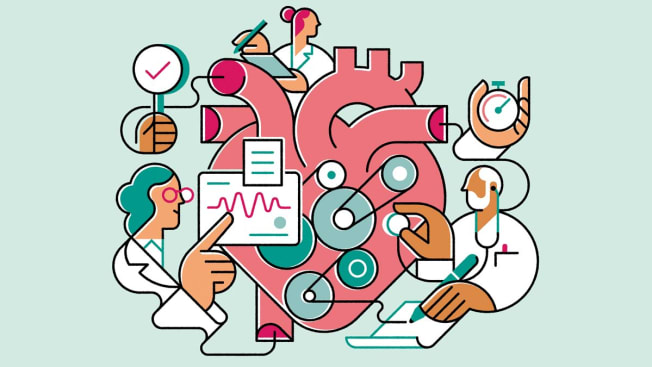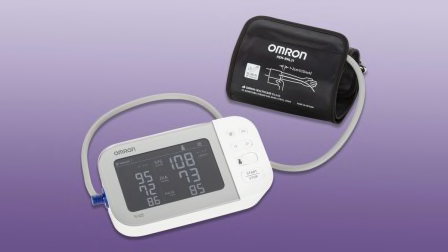Best Checkup for Your Heart
Tests you should have and those you can probably skip

Echocardiograms. Stress tests. Cardiac calcium tests. You may well have had some or all of these. Your doctor may have recommended certain ones annually, even if you’re at low risk for heart disease. But "the days of regular asymptomatic testing in your doctor’s office are long gone," says Michael Nanna, MD, an interventional cardiologist at the Yale School of Medicine.
In fact, some heart tests have been found to be used far too often, at little benefit. Plus, there are newer tests you might not be familiar with. So which should you have and when?
4 Key Screenings for Most of Us
Blood Pressure
The U.S. Preventive Services Task Force (USPSTF) recommends that adults ages 40 and older have their blood pressure measured by a healthcare provider at least once a year. You’ll want it checked more frequently if it’s over 120/80, Nanna says. In that case, it’s wise to do so at every doctor’s visit. And if you’re on blood pressure medication, also monitor it regularly at home.
Best Home Blood Pressure Monitors
See our reviews of blood pressure monitors and find out why the best place to check blood pressure may be at home.
Ask Your Doc About This One
Abdominal Ultrasound
An abdominal aortic aneurysm is an enlarging of the aorta, the main blood vessel that leads away from the heart. A onetime ultrasound has been shown to cut men’s risk of dying from a ruptured aneurysm, Nanna says. (Research suggests that women are less likely to have such a burst.) The USPSTF and the American Heart Association (AHA) recommend this screening for men ages 65 to 75 if they have ever smoked.
The AHA also advises the test for men ages 60 and up with a first-degree relative who had an AAA. But the Society for Vascular Surgery recommends screening for both men and women ages 65 to 75 with a history of smoking or a family history of the condition, and men and women over age 75 with a smoking history who have never been screened. If you’re a current or former smoker and/or have a family history of AAAs, talk with your doctor.
Only Some People Need These
Stress Test
During an exercise stress test, your heart is monitored while you walk on a treadmill or ride a stationary bike. This helps your doctor figure out how well your heart works when it’s pumping hard and fast. Some doctors may have included these in routine checkups in the past, but that’s no longer recommended. Still, about half of all stress tests ordered may be inappropriate, according to a 2022 AHA report.
"It shouldn’t be done as a routine test, period," says Weintraub. Stress tests can incorrectly suggest there are no significant coronary blockages (a false negative) or incorrectly suggest there are significant ones (a false positive). Some research suggests that the rates of false negatives and positives may be up to 20 percent, Newby says. "This could lead to unnecessary tests that are more invasive, like coronary angiograms, or failure to detect and treat," she says.
Weintraub says a stress test should be done if you have symptoms that suggest coronary artery disease, such as shortness of breath or chest pain when you walk. "In these cases, stress tests can be very useful and give us a sense of how extensive coronary artery disease really is," he says.
Electrocardiogram (EKG)
Small patches (electrodes) are attached to your arms, legs, and chest to record your heart’s electrical activity. This can tell if there’s abnormal activity that might indicate heart disease. "Some doctors still do them every year in patients age 50 or older, but they’re definitely low value as a general screening tool," Ruthmann says. In fact, the USPSTF doesn’t recommend routine EKGs for people of any age who have no symptoms of heart disease or risk factors for a heart attack or stroke.
But Ruthmann recommends having a baseline EKG in certain cases, such as if you have heart disease risk factors like hypertension, to help give your doctor an overall picture of your heart health. If it’s normal, there’s no need to repeat the test unless you experience symptoms such as heart palpitations, you’ve received a heart disease diagnosis, or you have a history of heart attack or stroke.
Echocardiogram
This ultrasound checks the structure and function of your heart. About 20 percent of "echos" ordered may be inappropriate, according to the 2022 AHA report. "These ultrasounds are overused because they are so easy to use," Weintraub says. "The echo machines used to be the size of a big fridge, but now they’re the size of a laptop." In some cases, an echo done during a routine heart checkup may find something minor, "like a slight valve leak that’s actually still normal, but the doctor wants to monitor it and it leads to annual follow-ups," Ruthmann says. "It creates a lot of unnecessary repeat echos, and a lot of anxiety for patients."
An echo is warranted when you show signs of heart disease, says Vinay Kini, MD, a cardiologist at Weill Cornell Medicine in New York City and a co-author of the 2022 AHA report. "It’s very helpful if we suspect a structural or valvular heart problem, especially if paired with symptoms of heart disease or heart failure, such as shortness of breath and leg swelling," he says.
Coronary Calcium Scan
This imaging test checks for calcium deposits in your heart arteries. "If you have a buildup of calcium, it can narrow the arteries and reduce blood flow to your heart," Kini says. It’s not recommended for routine use but can help if it’s unclear whether you should begin taking cholesterol-lowering drugs. "If someone’s risk factors place them right on the border, the level of calcium in their arteries can give us a sense of whether they should start statins or not," Kini says.
Cardiac MRIs and coronary CT scans
These use X-ray beams (CT) or radio waves (MRI) to get 3D images of your heart, which are more detailed than those from an echocardiogram. But coronary CT scans aren’t considered very reliable for older adults. Cardiac MRIs are, but take more time to do than other heart tests, they’re costly, and they’re usually limited to large medical centers, Ruthmann says.
If You Suspect a Heart Attack
Call 911 ASAP. "You want to be in an ambulance [on the way to the emergency room] in case you go into cardiac arrest so there’s equipment there to restart your heart," Newby says. Also, emergency medical technicians can do an EKG in the ambulance and send the results to the hospital to help determine if it’s a heart attack.
Depending on the results, at the ER you may be taken immediately for an angiogram (where a catheter inserted into a leg artery is guided to heart blood vessels to identify blockages). If the EKG doesn’t show the need for an urgent angiogram, doctors will check your blood levels of troponin, a protein that rises when the heart muscle is damaged, Newby says. This doesn’t always show up right away, so you may have multiple blood tests (and EKGs). ER doctors may also do a chest X-ray and an echocardiogram.
Editor’s Note: This article also appeared in the January 2024 issue of Consumer Reports On Health.




















